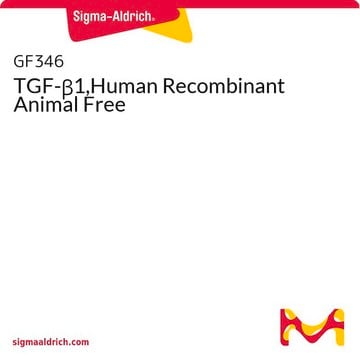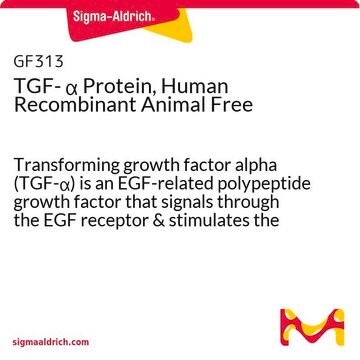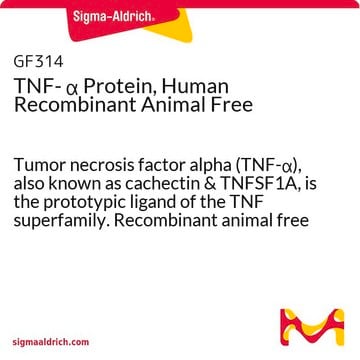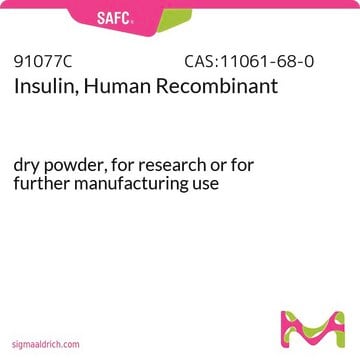H8541
Factor de crecimiento transformante-β1 human
≥95% (SDS-PAGE), recombinant, expressed in HEK 293 cells, lyophilized powder, suitable for cell culture
Sinónimos:
TGF-β1
About This Item
Productos recomendados
product name
Factor de crecimiento transformante-β1 human, TGF-β1, Xeno-free, recombinant, expressed in HEK 293 cells, suitable for cell culture
biological source
human
Quality Level
recombinant
expressed in HEK 293 cells
assay
≥95% (SDS-PAGE)
form
lyophilized powder
potency
≤0.5 ng/mL EC50
quality
endotoxin tested
mol wt
dimer 25 kDa (non-glycosylated)
packaging
pkg of 5 μg
storage condition
avoid repeated freeze/thaw cycles
technique(s)
cell culture | mammalian: suitable
impurities
≤1 EU/μg
UniProt accession no.
storage temp.
-10 to -25°C
Gene Information
human ... TGFB1(7040)
¿Está buscando productos similares? Visita Guía de comparación de productos
General description
Application
- to study the expression of PDGFRB (Platelet derived growth factor receptor β) in association with transforming growth factor-β signaling.
- to stimulate lung fibrosis in human fetal lung fibroblast cell line in order to further measure the in-plane elasticity of live cell layers using a pressure sensor embedded microfluidic device.
- to study the effect of TGF-β on HTRA1 (high-temperature requirement A1)-affected Wnt target genes.
Biochem/physiol Actions
Physical form
Analysis Note
signalword
Danger
hcodes
Hazard Classifications
Eye Dam. 1 - Skin Corr. 1B
Storage Class
8A - Combustible corrosive hazardous materials
wgk_germany
WGK 2
flash_point_f
Not applicable
flash_point_c
Not applicable
Certificados de análisis (COA)
Busque Certificados de análisis (COA) introduciendo el número de lote del producto. Los números de lote se encuentran en la etiqueta del producto después de las palabras «Lot» o «Batch»
¿Ya tiene este producto?
Encuentre la documentación para los productos que ha comprado recientemente en la Biblioteca de documentos.
Los clientes también vieron
Artículos
Discover answers to your frequently asked questions about animal component-free, xenobiotic-free, and chemically defined media and reagents for cell culture.
Discover answers to your frequently asked questions about animal component-free, xenobiotic-free, and chemically defined media and reagents for cell culture.
Discover answers to your frequently asked questions about animal component-free, xenobiotic-free, and chemically defined media and reagents for cell culture.
Discover answers to your frequently asked questions about animal component-free, xenobiotic-free, and chemically defined media and reagents for cell culture.
Contenido relacionado
Discover cancer research resources with modeling and profiling tools for cell culture, genomics, biomarkers, and more to help maximize your cancer research.
Discover cancer research resources with modeling and profiling tools for cell culture, genomics, biomarkers, and more to help maximize your cancer research.
Discover cancer research resources with modeling and profiling tools for cell culture, genomics, biomarkers, and more to help maximize your cancer research.
Discover cancer research resources with modeling and profiling tools for cell culture, genomics, biomarkers, and more to help maximize your cancer research.
Nuestro equipo de científicos tiene experiencia en todas las áreas de investigación: Ciencias de la vida, Ciencia de los materiales, Síntesis química, Cromatografía, Analítica y muchas otras.
Póngase en contacto con el Servicio técnico










